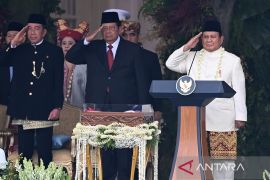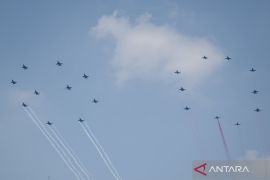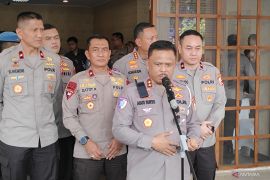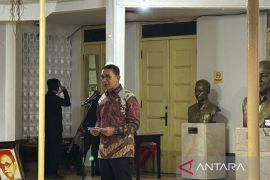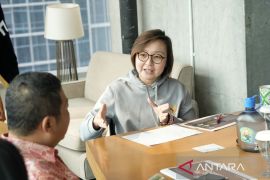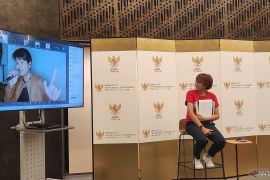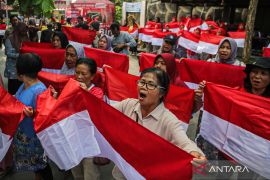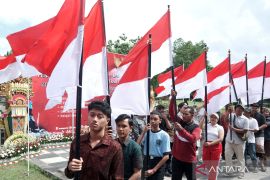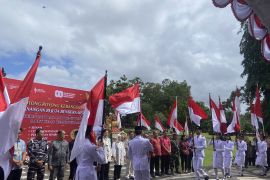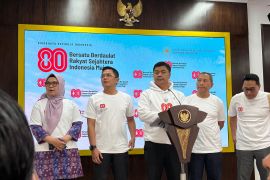In Indonesia, Independence Day is annually celebrated on August 17 as a day of family celebrations with ceremonies, picnics, and activities associated with the day that include cracker eating competitions and sporting events, such as football and tug-of-war games.
But the 73rd anniversary of Independence Day should not just remain a routine holiday, but should usher in a psychological revolution to build this nation.
Celebrations of Independence Day are of great significance to the people, as is the history of Indonesia, and, therefore, it is time to connect the idea of independence with the spirit of unity in diversity.
The Indonesian people are encouraged to build Unity in Diversity (Bhineka Tunggal Ika), because the diversity of this nation is God`s gift to realize the harmony that must be built in the space of tolerance.
Hence, the commemoration of Indonesia`s 73rd Independence Day this year on Friday was held across the country, with a strong message of upholding the spirit of independence, and unity in diversity.
Independence Day was not merely celebrated by the central and regional governments, as well as among the people in the country, but also by representatives of the Indonesian government abroad.
Indonesia consists of 34 provinces with different customs, traditions, and languages. One of the forms of regionalism are their customary clothing, which has a deep value and philosophy.
To celebrate Independence Day this year, President Joko Widodo (Jokowi) wore the traditional Aceh clothing of Meukeusah,
considered to be a highlight of the customs of Aceh, while Vice President Jusuf Kalla and the Presidential Security Guards were also dressed in different traditional clothing from different areas across the country.
In addition, some invited guests, who packed the courtyard of the Merdeka Palace, were also seen wearing their respective traditional attires to enliven the celebration of the Independence Day anniversary.
Since the commemoration of Independence Day in 2017, President Joko Widodo has initiated the wearing of regional clothing for invited guests, as a form of appreciation for the diversity of the Nusantara culture.
"Yes, our country has a lot of customs and traditions. There are also many traditional clothes, hundreds, maybe thousands," the President said.
The head of state, himself, said that this year he wore the traditional clothing of Aceh, which he chose from many different choices.
In the meantime, First Lady Iriana Joko Widodo wore a Minangkabau traditional dress, while other guests wore traditional clothing from West Java, West Sumatra, Bali, DKI Jakarta, East Java, Sulawesi, and other provinces.
Head of the TNI General Staff Vice Admiral Didit Herdiawan, at the ceremony of Independence Day at the TNI Headquarters in Cilangkap, said that building Indonesian unity is a commitment that must be kept alive to ensure the prosperity of the society and nation.
According to him, all citizens, state institutions, even state officials and leaders, are bound to be loyal to the ideological and constitutional philosophical mandate since Indonesia became independent.
He noted that for 73 years, the Indonesian nation has filled its independence, and its history has recorded that it was not easy for the country to escape from various challenges and obstacles.
To date, the people of Indonesia continue to struggle to fill the independence granted by God Almighty to achieve the prosperity of the nation.
By living with the grace and mercy of God Almighty, the Indonesian people believe that the independence achieved, as well as the sovereignty of the state that has been realized in the frame of the
Unitary State of the Republic of Indonesia (NKRI), is a state system based on Pancasila and the 1945 Constitution.
Pancasila is the philosophical basis of Indonesia`s life and society, which consists of "Five Moral Principles": The belief in the one and only God, a just and civilized humanity, and the unity of Indonesia.
Also, democracy, guided by the inner wisdom in the unanimity arising out of deliberations amongst representatives, and social justice for all of the people of Indonesia.
Pancasila embraces humanitarian principles that have become the true and core identity of Indonesia.
President Jokowi`s mental revolution policy is an answer to Indonesia`s need for a breakthrough in its human and social development, especially weeding out corruption during the New Order era.
The implementation of the mental revolution policy is highlighted in the education sector.
President Jokowi believes that minds can be effectively changed only if strategies to achieve this goal are in place right from the start of primary education.
In Jokowi`s opinion, Indonesia`s primary school students should be educated about the importance of character development, manners and etiquette.
Reporter: Otniel Tamindael
Editor: Fardah Assegaf
Copyright © ANTARA 2018

